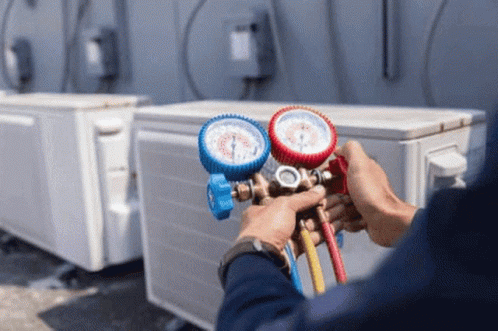What Does Hvac Hvacr Mean?
The term HVAC is an acronym that stands for Heating, Ventilation, and Air Conditioning. It refers to a set of systems used to control the temperature and air quality in residential and commercial buildings. These systems can heat, cool, and circulate air between the inside and outside of a building. The acronym HVACR includes an additional component, Refrigeration, which specifically focuses on cooling and preserving perishable items. While HVAC is the more commonly used term, HVACR is still used in certain contexts to highlight the inclusion of refrigeration. The origins of HVAC and HVACR can be traced back to the early 20th century when inventors and scientists like Michael Faraday and Sadi Carnot made significant contributions to the development of heating, ventilation, and air conditioning systems. The first functional air conditioning system was invented by Alfred Wolff in 1902, and the term “air conditioning” was coined by Stuart Cramer in 1904. As early as 1899, Coyne College offered HVAC training, making it the first college in the world to do so. As the technology behind HVAC systems improved, the acronyms HVAC and HVACR were created to simplify their reference. It’s important to note that the acronyms HVAC and HVACR are primarily used in technical and professional settings when communicating with HVAC specialists or sellers. In everyday conversations, people often refer to these systems as “air conditioners” or use the term “climate control” to describe the regulation of temperature and air quality in buildings. Here are some examples of how to use HVAC and HVACR in conversation:
- “I called a technician to fix my HVAC system. It’s been acting up lately.”
- “The HVACR in our office broke down, and it’s been sweltering in here. I hope they can fix it soon.”
- “I’m considering installing an HVAC system in my new home. It’ll make the summers much more bearable.”
- “The HVAC technician explained that regular maintenance is crucial for the longevity of the system.”
- “I’m studying HVACR in college because I’m passionate about creating comfortable indoor environments.”
In conclusion, HVAC and HVACR are acronyms that stand for Heating, Ventilation, and Air Conditioning, and Heating, Ventilation, Air Conditioning, and Refrigeration, respectively. They refer to systems used to regulate temperature and air quality in buildings. While HVAC is the more commonly used term, HVACR emphasizes the inclusion of refrigeration. These acronyms are primarily used in technical and professional settings and are interchangeable with the term “air conditioners” in everyday conversations.



What Does Hvac Hvacr Mean From a Girl?
When a girl uses the term HVAC or HVACR, she is most likely referring to the actual meaning of the acronyms, which is Heating, Ventilation, and Air Conditioning, and Heating, Ventilation, Air Conditioning, and Refrigeration, respectively. Girls may use these terms in conversations related to building systems, temperature control, or discussions with HVAC specialists.
Here are some key points to consider:
- Specific meaning from a girl: Girls may use HVAC or HVACR to discuss heating, cooling, and air conditioning systems in buildings. They might mention it when talking about repairs, installations, or maintenance.
- How girls use it: Girls may use HVAC or HVACR in conversations with friends or family members who are knowledgeable about building systems. They might also use it when discussing home improvement projects or sharing experiences with HVAC professionals.
- How to reply: If someone uses HVAC or HVACR in a conversation with you and you are unfamiliar with the topic, it’s perfectly acceptable to ask for clarification or express your interest in learning more.
It’s important to note that girls generally use HVAC and HVACR similarly to everyone else. These acronyms are primarily used in technical and professional settings when discussing heating, ventilation, air conditioning, and refrigeration systems. In everyday conversations, people often refer to these systems as “air conditioners” or use the term “climate control” to describe temperature regulation in buildings.
So if a girl mentions HVAC or HVACR in a conversation with you, don’t be alarmed! It’s just her way of discussing heating and cooling systems. Feel free to engage in the conversation and ask questions if you’re interested in learning more about the topic.
[No examples available]
What Does Hvac Hvacr Mean From a Guy?
When a guy uses the term HVAC or HVACR, it generally carries the same meaning as when a girl uses it. Guys may also use these acronyms to refer to heating, ventilation, air conditioning, and refrigeration systems in buildings. However, there might be some slight differences in how guys use and interpret these terms compared to girls.
Here are some points to consider when a guy uses HVAC or HVACR:
- Similar meanings: Like girls, guys may use HVAC or HVACR to discuss heating, cooling, and air conditioning systems in buildings. They might mention it when talking about repairs, installations, or maintenance.
- Technical discussions: Guys may use HVAC or HVACR in conversations with friends or family members who have knowledge or experience in building systems. They might engage in technical discussions about system components, energy efficiency, or troubleshooting.
- Interest in DIY projects: Some guys may use HVAC or HVACR when discussing DIY projects related to heating and cooling systems. They might share their experiences with installations or repairs they have done themselves.
- Professional context: In professional settings, guys may use HVAC or HVACR when communicating with HVAC specialists or sellers. They might discuss system specifications, pricing, or industry trends.
When a guy uses HVAC or HVACR in conversation, it’s best to assume that he is referring to the technical aspects of heating, ventilation, air conditioning, and refrigeration systems. If you’re unsure about the topic or want to engage in the conversation, feel free to ask questions or express your interest in learning more.
Overall, guys and girls generally use HVAC and HVACR similarly. These acronyms are primarily used in technical and professional settings when discussing heating, ventilation, air conditioning, and refrigeration systems. In everyday conversations, people often refer to these systems as “air conditioners” or use the term “climate control” to describe temperature regulation in buildings.
So if a guy mentions HVAC or HVACR in a conversation with you, don’t worry! It’s just his way of discussing heating and cooling systems. You can join in the conversation and ask questions to show your interest and curiosity.
Example 1:
- Guy 1: Dude, my HVAC system broke down in the middle of summer. It’s like a sauna in my house!
- Guy 2: That’s rough, man. You better call a technician ASAP before you turn into a human popsicle.
Example 2:
- Guy 1: I just installed a smart thermostat for my HVAC system. Now I can control the temperature with my phone!
- Guy 2: No way! That’s some next-level technology right there. You’re living in the future, dude.
Example 3:
- Guy 1: My HVACR unit is making weird noises. I think it’s possessed or something.
- Guy 2: Haha, maybe you have a ghost who wants to stay cool. Better call the Ghostbusters instead of an HVAC technician!
Example 4:
- Guy 1: I’m thinking of starting a side hustle as an HVAC technician. What do you think?
- Guy 2: Dude, that’s a cool idea! You’ll be the hero who saves people from sweaty summers and freezing winters. Plus, you’ll have some killer biceps from carrying those heavy units.
Example 5:
- Guy: I just got a new job as an HVAC salesperson. Time to bring the heat and coolness to all the buildings in town!
- Girl: That’s awesome! You’ll be the go-to guy for all things temperature control. Just don’t forget to give me a discount when I need a new air conditioner, okay?
Origin of Hvac Hvacr
The term “HVAC” is an acronym that stands for Heating, Ventilation, and Air Conditioning. It refers to a set of systems used to control the temperature and air quality in residential and commercial buildings. These systems can heat, cool, and circulate air between the inside and outside of a building. The acronym “HVACR” includes an additional component, Refrigeration, which specifically focuses on cooling and preserving perishable items. While HVAC is the more commonly used term, HVACR is still used in certain contexts to highlight the inclusion of refrigeration.
The origins of HVAC and HVACR can be traced back to the early 20th century when inventors and scientists like Michael Faraday and Sadi Carnot made significant contributions to the development of heating, ventilation, and air conditioning systems. The first functional air conditioning system was invented by Alfred Wolff in 1902, and the term “air conditioning” was coined by Stuart Cramer in 1904. As early as 1899, Coyne College offered HVAC training, making it the first college in the world to do so. As the technology behind HVAC systems improved, the acronyms HVAC and HVACR were created to simplify their reference.
It’s important to note that the acronyms HVAC and HVACR are primarily used in technical and professional settings when communicating with HVAC specialists or sellers. In everyday conversations, people often refer to these systems as “air conditioners” or use the term “climate control” to describe the regulation of temperature and air quality in buildings.
Here are some examples of how to use HVAC and HVACR in conversation:
- “I called a technician to fix my HVAC system. It’s been acting up lately.”
- “The HVACR in our office broke down, and it’s been sweltering in here. I hope they can fix it soon.”
- “I’m considering installing an HVAC system in my new home. It’ll make the summers much more bearable.”
- “The HVAC technician explained that regular maintenance is crucial for the longevity of the system.”
- “I’m studying HVACR in college because I’m passionate about creating comfortable indoor environments.”
In conclusion, HVAC and HVACR are acronyms that stand for Heating, Ventilation, and Air Conditioning, and Heating, Ventilation, Air Conditioning, and Refrigeration, respectively. They refer to systems used to regulate temperature and air quality in buildings. While HVAC is the more commonly used term, HVACR emphasizes the inclusion of refrigeration. These acronyms are primarily used in technical and professional settings and are interchangeable with the term “air conditioners” in everyday conversations. The origins of the terms can be attributed to the contributions of various inventors and scientists in the early 20th century.
Frequently Asked Questions
Slangs similar to Hvac Hvacr
The terms ghosted, breadcrumbing, situationship, half-night stand, Netflix & chill, and poly are not similar to HVAC or HVACR because they are unrelated to heating, ventilation, air conditioning, or refrigeration systems. These terms are slang words used to describe various dating or relationship situations, while HVAC and HVACR are technical acronyms used in the context of heating, ventilation, air conditioning, and refrigeration systems.
Is Hvac Hvacr A Bad Word?
No, “hvac hvacr” is not a bad word or vulgar word. It is an acronym that stands for Heating, Ventilation, Air Conditioning, and Refrigeration. It is a technical term used in the field of technology to refer to systems used to move or circulate air between the outside and inside areas of residential and commercial buildings. It is commonly used by HVAC specialists or sellers.
Is Hvac Hvacr a Typo or Misspelling?
No, “hvac” and “hvacr” are not misspellings or typos. They are acronyms that stand for Heating, Ventilation, and Air Conditioning, and Heating, Ventilation, Air Conditioning, and Refrigeration, respectively. They refer to systems used to control temperature and air quality in buildings.





